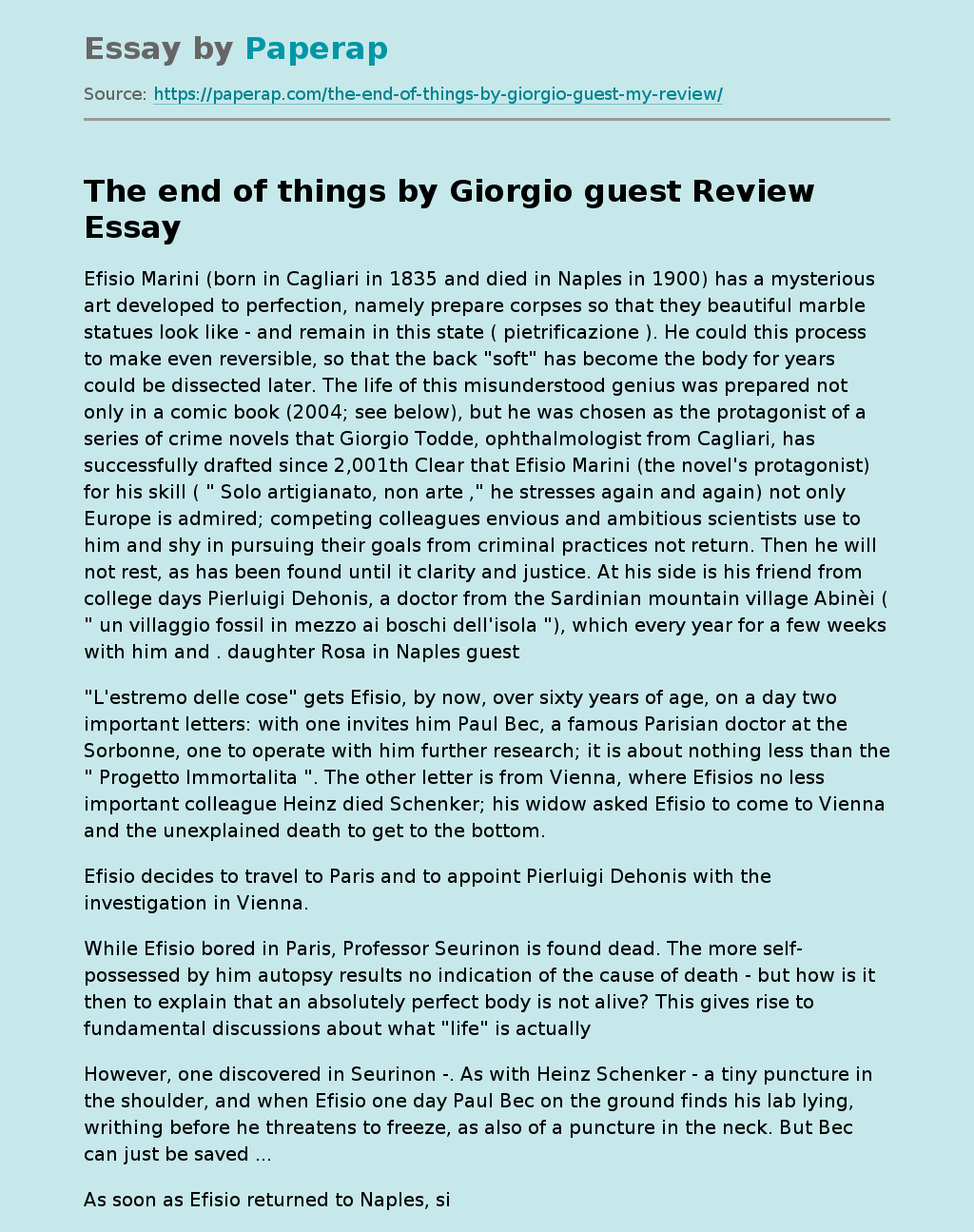"The End of Things" by Giorgio Guest
The following sample essay on “The End of Things by Giorgio Guest” is a review of a literary work. In particular, the protagonist of the novel, Efisio Marini, is discussed.
Efisio Marini (born in Cagliari in 1835 and died in Naples in 1900) has a mysterious art developed to perfection, namely prepare corpses so that they beautiful marble statues look like – and remain in this state. He could this process to make even reversible, so that the back “soft” has become the body for years could be dissected later.
The life of this misunderstood genius was prepared not only in a comic book (2004; see below), but he was chosen as the protagonist of a series of crime novels that Giorgio Todde, ophthalmologist from Cagliari, has successfully drafted since 2,001th Clear that Efisio Marini (the novel’s protagonist) for his skill ( ” Solo artigianato, non arte ,” he stresses again and again) not only Europe is admired; competing colleagues envious and ambitious scientists use to him and shy in pursuing their goals from criminal practices not return.
Then he will not rest, as has been found until it clarity and justice. At his side is his friend from college days Pierluigi Dehonis, a doctor from the Sardinian mountain village Abinèi ( ” un villaggio fossil in mezzo ai boschi dell’isola “), which every year for a few weeks with him and . daughter Rosa in Naples guest
“L’estremo delle cose” gets Efisio, by now, over sixty years of age, on a day two important letters: with one invites him Paul Bec, a famous Parisian doctor at the Sorbonne, one to operate with him further research; it is about nothing less than the ” Progetto Immortalita “.
The other letter is from Vienna, where Efisios no less important colleague Heinz died Schenker; his widow asked Efisio to come to Vienna and the unexplained death to get to the bottom.
Efisio decides to travel to Paris and to appoint Pierluigi Dehonis with the investigation in Vienna. While Efisio bored in Paris, Professor Seurinon is found dead. The more self-possessed by him autopsy results no indication of the cause of death – but how is it then to explain that an absolutely perfect body is not alive? This gives rise to fundamental discussions about what “life” is actually
However, one discovered in Seurinon -. As with Heinz Schenker – a tiny puncture in the shoulder, and when Efisio one day Paul Bec on the ground finds his lab lying, writhing before he threatens to freeze, as also of a puncture in the neck. But Bec can just be saved … As soon as Efisio returned to Naples, since dies before his eyes, another physician from Paris -. And the murders goes further. Efisio details recognizes and evaluates sharp as Sherlock Holmes, but mainly he trusts his intuition. In the end it is the faithful Dehonis that can solve the case with unusual means and congenial dialogue with Efisio.
Despite the killings and attacks, the voltage generating traditional whodunit structure and the surprising twists this is not a thriller. The tone is thoughtful, sometimes melancholic ( ” La forza Dell’Idea lo riprende perché la sua anima, coperta dall’età, non vuole la geometria. La geometria lo asfissia e l’ordine, di colpo, lo invecchia; they discussed issues of death and human life, truth and madness, while ideological, philosophical differences are apparent. The dialogues are scarce, laconic, sententious and heavy sound sometimes a little rhetorical, sought apart.
People like lectures (. Efisios typical gesture is raised finger), and the characters seem more like papery support of theories rather than as people of flesh and blood and emotions: Bec: ” In un medium interno è contenuto il deposito della vita […] e io l’ho riscostruito … “- Efisio:” Io vi devo offrire l’architettura dei corpi preservati dalla putrefazione e voi instillerete dentro i corpi induriti il medium della vita, vero “But Bec does not respond to this, and Efisio Argue quietly:” non è sufficiente ammettere la propria follia per guarire e nessun folle cerca la guarigione Anzi, cerca. altra follia. “(page 41 et seq.)
Giorgio Toddes books are with us under” marketed Sardinia thriller “and recommended in all the guidebooks. I also chose this relatively recent (2009) book by him on the spot, bought and read – but it has me so touched, as I had the bookseller due to the blurb and advertising hoped it to me. Even the scenes – the world cities of Paris and Vienna shortly before the turn of the century, to Naples, Cagliari and Abinèi – remain pale. Pretty are the scenes in a Neapolitan restaurant (Ch. 4) and its parallel in Paris (Ch. 11), but to evoke atmosphere is not Toddes intention. He is concerned with ” l’estremo delle cose .”
For more information about the real Efisio Marini, see <a
“L’estremo delle cose” has not yet been published in German.
"The End of Things" by Giorgio Guest. (2019, Nov 18). Retrieved from https://paperap.com/the-end-of-things-by-giorgio-guest-my-review/

